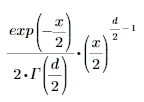Chi-Squared Distribution
The following functions are associated with the chi-squared equation:

• dchisq(x, d)—Returns the probability density for value x.
• pchisq(x, d)—Returns the cumulative probability distribution for value x.
• qchisq(p, d)—Returns the inverse cumulative probability distribution for probability p.
• rchisq(m, d)—Returns a vector of m random numbers having the chi-squared distribution.
Arguments
• x is a scalar or vector of real values, x ≥ 0. Negative values of x produce a result of zero.
• d is a positive integer representing the degrees of freedom. While the distribution equation is meant to be formulated for integers, you can also use real values.
• Γ is the Gamma function.
• p is a real probability, 0 ≤ p ≤ 1.
• m is an integer, m > 0.
• All arguments are unitless numbers.
In previous versions of PTC Mathcad Prime, units were allowed in the arguments of the random numbers distribution function. Starting with PTC Mathcad Prime 10.0.0.0, all arguments are unitless. This change was made to align the behavior of the random distribution function to other probability distribution functions. If your arguments used units, make sure to adjust them for maintaining a correct scaling. |